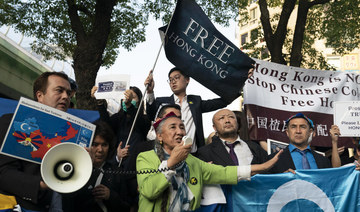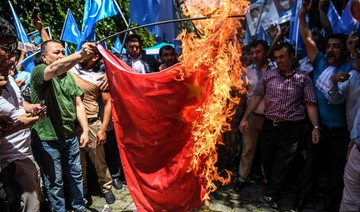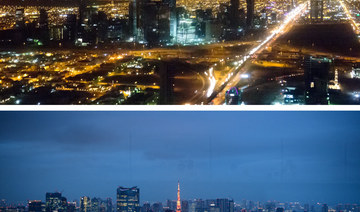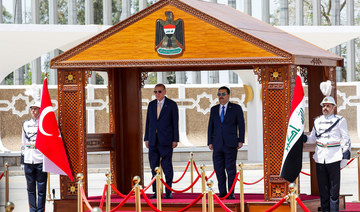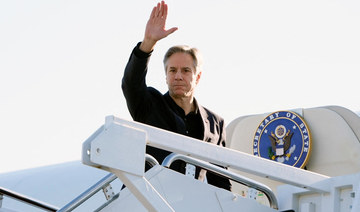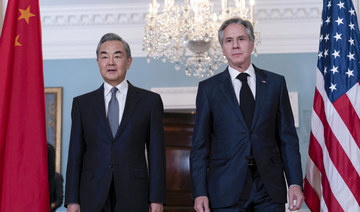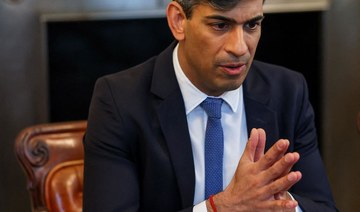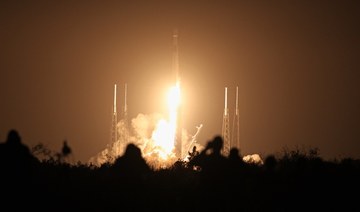ISTANBUL, Turkey: A decade after deadly riots tore through his hometown, Kamilane Abudushalamu still vividly recalls the violence that left him an exile.
On July 5, 2009, Abudushalamu was hiding with his father on the 10th floor of an office tower in Urumqi, the capital of China’s Xinjiang region that is home to the Turkic Uighur ethnic minority. By a park, he spotted a bus on fire. Then he heard a crack as a motorcycle nearby exploded.
Hours later, when he and his father stepped out to sprint home, he saw crowds of Uighurs stabbing Han Chinese in front of a middle school. The bodies of half a dozen people lay scattered on the streets — just a fraction of the estimated 200 killed that night.
Abudushalamu and tens of thousands of other Uighurs now live in Turkey, cut off from friends and family back home. Analysts say the Urumqi riots set in motion the harsh security measures now in place across Xinjiang, where about 1 million Uighurs, Kazakhs and other Muslims are estimated to be held in heavily guarded internment camps. Former detainees have told The Associated Press that within, they are subject to indoctrination and psychological torture.
Abudushalamu was just 9 years old when the riots took place. At the time, he knew he was witnessing something terrible, but he never imagined where the following years would lead.
“I thought Han and Uighur people could be at peace,” he said. “The camps? I never thought that would happen.”
___
DECADES OF RESENTMENT
The riots started as a peaceful protest.
Weeks before, Han workers killed at least two Uighur migrants in a brawl at a toy factory in Shaoguan, an industrial city in China’s coastal Guangdong province. The Han workers were angry about the alleged rapes of Han women by Uighur men, though a government investigation later concluded there was no evidence such an assault had taken place.
Images and videos of the brawl quickly circulated among Uighurs back in Xinjiang, including gory scenes of what appeared to be a Han Chinese man dragging a dead Uighur by his hair.
The videos enraged many Uighurs long upset with the Han-dominated government that took control of their region following the Communist revolution in 1949.
The litany of complaints was long: heavy restrictions on religious education, discrimination against college-educated Uighurs looking for jobs, subsidies and benefits for Han migrants to settle on lands once owned by Uighurs.
Among the most odious were threats from state officials of fines or even jail time if parents didn’t send their young, unmarried daughters to work in factories in inner China . “Hashar,” a program that forced farmers to pave roads, dig ditches, and clear land for crops for the government for no pay fueled further resentment.
The killed Uighur workers had been on a state employment program, sent more than 1,000 miles (1,600 kilometers) from home. For many, their deaths crystallized everything that was wrong about Beijing’s heavy-handed interventionist policies — and the belittling racism they felt they were subjected to by the Han Chinese.
The images spurred Urumqi students to organize a protest on July 5 demanding a government investigation. Demonstrators were stopped by police in the late afternoon, and tensions mounted until officers opened fire, Uighur witnesses say.
Two students present at the protests told AP that they were shot at. One recalled that as he turned and ran, bullets whizzed by his head and others around him dropped to the ground.
Furious Uighurs attacked Han civilians on the streets. An estimated 200 people were killed — stabbed, beaten or burned alive in the melees that followed. Uighurs smashed storefronts, overturned cars and buses and set some ablaze.
___
THE CRACKDOWN DESCENDS
Abudushalamu hid with his family for days as mobs of Uighurs and Han killed each other in cycles of bloody revenge.
When they stepped outside a few days later, the streets were eerily empty, Abudushalamu said. Then the police arrived and started shooting.
“Two maybe SWAT team (members) came after me and shot at me,” said Abudushalamu, now 19. “The bullet went through right behind my right ear. I’m lucky I’m still alive.”
In the days after the violence on July 5, 2009, Beijing had sent in thousands of troops to restore order. For weeks, they fired tear gas, raided businesses and swept through Uighur neighborhoods to arrest hundreds, many of whom were punished with decades in prison. The entire region of 20 million people was cut off from the Internet for months in an attempt to curtail use of social media.
Normality had returned, but Xinjiang was never quite the same. Ethnic divisions hardened. Han Chinese avoided Uighur neighborhoods, and vice versa. Many Han Chinese steered clear of the whole of the region’s south, home to most of Xinjiang’s Uighurs, because they believed it was too dangerous.
Experts say that July 5 and the subsequent crackdown was a “turning point.”
“From that moment on, China took a very hard-line position toward the control of religion and the control of minority ethnic groups in the region,” said Nicholas Bequelin, Amnesty International’s regional director for East and Southeast Asia. “It increased dramatically its security operation. That really is what led to the situation today.”
___
UNITED “LIKE POMEGRANATE SEEDS“
In the following years, a series of violent terror attacks rocked Xinjiang and elsewhere. Dozens of civilians were hacked to death at a busy train station in China’s south. A Uighur drove a car into crowds at Beijing’s Tiananmen Square. Forty-three died when men threw bombs from two sports utility vehicles plowing through a busy market street in Urumqi.
When newly appointed Chinese President Xi Jinping visited Xinjiang in 2014, bombs tore through an Urumqi train station, killing three and injuring 79. In a Xinjiang work conference shortly afterward, Xi called on the state to integrate different ethnicities and remold religion to ward off extremism.
“The more separatists attempt to sabotage our ethnic unity, the more we should try to reinforce it,” state media quoted Xi as saying. China’s ethnicities, Xi said, could and should be united like “the seeds of a pomegranate.”
Already tight limits on religion, culture, education and dress tightened even further, with restrictions on long beards and headscarves and the detentions of prominent Uighur academics and literary figures who were widely considered moderate advocates of traditional Uighur culture.
After a new party secretary was appointed to take control of Xinjiang in 2016, thousands began to vanish into a vast network of prison-like camps. Beijing calls them “vocational training centers” designed to ward off terrorism and root out extremist thoughts, but former detainees describe them as indoctrination centers which arbitrarily confine their inmates and subject them to torture and food deprivation.
That same year, Abudushalamu’s father had taken him to Turkey to study at a boarding school and then returned to China. The following June, he stopped responding to messages, and Abudushalamu never heard from his father again.
Abudushalamu finally discovered his father’s fate last year when an acquaintance in Turkey told him he saw his father in an internment camp. He says he has now heard of more than 50 family members that have been detained in Xinjiang. Researchers estimate the camps now hold 1 million or more Uighurs and other members of Xinjiang’s ethnic minorities.
Abudushalamu says there is no reason for authorities to “train” his father, a successful businessman who speaks nine languages.
“It’s delusional,” he said. “Why does he still need to be ‘educated?’“
China locks down Xinjiang a decade after deadly ethnic riots
China locks down Xinjiang a decade after deadly ethnic riots
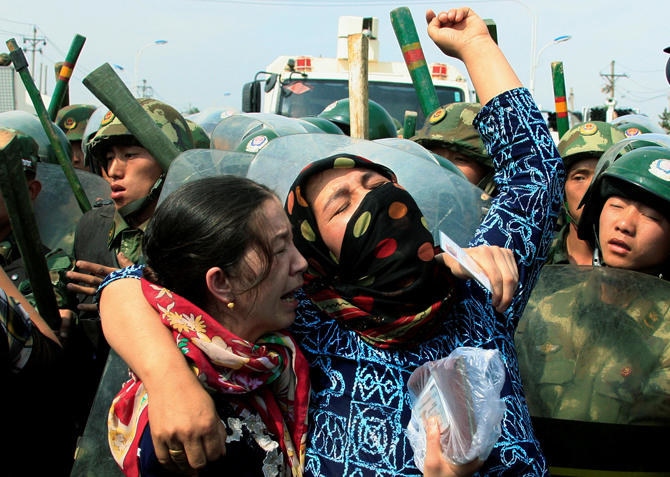
- Riots erupted in mid-2009 Han Chinese workers killed at least two Uighur migrants in a brawl at a toy factory in Shaoguan
- In the following years, a series of violent terror attacks rocked Xinjiang and elsewhere
Bangladeshis pray for rain as heatstroke deaths rise
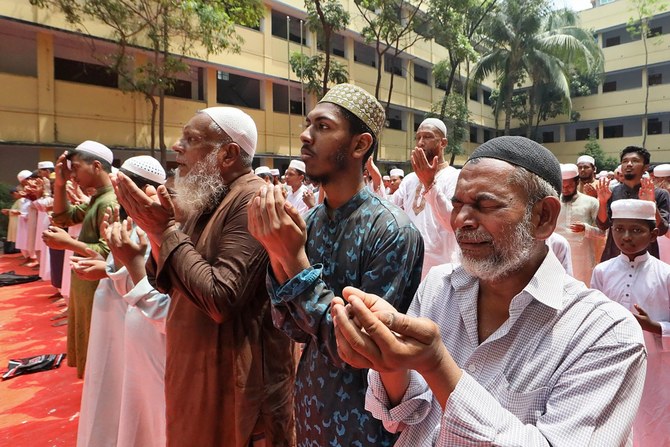
- Country is reaching limit of adaptability to extreme weather, report warns
- Heatwave has shut schools for 33m Bangladeshi children
DHAKA: Thousands of Bangladeshis have gathered in Dhaka to pray for rain in the middle of an extreme hot spell that has put health authorities on heatstroke alert.
The weather across the region is usually hot across the region in April before the summer monsoon season, but this year temperatures have been unusually high, reaching 42 degrees Celsius in parts of Bangladesh.
The country has been on alert since last week, as the punishing heatwave has disrupted agriculture, raised the risk of health complications and forced schools to close for 33 million children.
As the Bangladesh Meteorological Department renewed its warning that the heatwave is likely to persist during the weekend — or until a new notice is issued — thousands of people in Dhaka prayed on Wednesday and Thursday for relief.
They gathered in city mosques and rural fields to pray for rain.
“Special prayers for rain have been organized in many parts of Dhaka on Thursday. Thousands of people joined these prayers ... in addition to that, a special prayer for rain, which Muslims around the world have practiced since the days of the Prophet Muhammad, has taken place in many parts across the country,” Motiur Rahman Akand, spokesperson of the Bangladesh Jamaat-e-Islami, the country’s largest religious political party, which organized the prayers, told Arab News.
“When there is a natural crisis, especially drought, which causes severe suffering for human beings and all other living creatures, people should seek help from the Almighty to get relief from this situation.”
Hospitals were on high alert as at least 20 people died from heatstroke in the past five days alone.
“We have been preparing quite ahead for managing heatwave-related patients ... all the government health facilities are guided not to admit any other patients unless it’s an emergency,” Dr. Moinul Ahsan, director of the hospital wing of the Directorate General of Health Services, told Arab News.
“We are on alert and monitoring the situation closely. Working-class people are suffering most amid this heatwave ... children, pregnant women and the elderly are also most vulnerable in this situation.”
Bangladesh’s geography and low-lying delta topography make it particularly vulnerable to the adverse effects of climate change, and for the past two decades, the country has launched various environmental schemes to mitigate the worsening situation.
Ranking among the 10 countries most prone to climate devastation, Bangladesh has been recognized as a global leader in adaptation and resilience, and in 2005 was one of the first least-developed countries to launch a national adaptation program of action.
A report released in February by the International Centre for Climate Change and Development, a leading research institute in Dhaka, warned that Bangladesh is reaching the limit of its ability to adapt to extreme weather.
Turkiye offers Iraq technical help to bolster border security
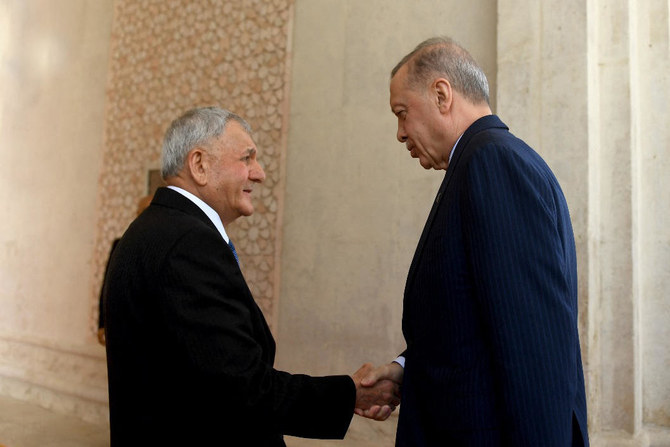
- A delegation from Iraq earlier visited Turkiye to examine the border security systems that Turkiye offered to provide
- Discussions for security cooperation still under way
ANKARA: Turkiye is in discussions with Iraq to provide technical assistance to Baghdad for securing its borders to prevent movements of outlawed Kurdistan Workers Party (PKK) militants around the region, a Turkish defense ministry official said on Thursday.
Turkish President Tayyip Erdogan visited Baghdad and Irbil this week as Ankara ramped up cross-border operations against PKK militants based in mountainous, mainly Kurdish northern Iraq.
The two countries agreed to a strategic framework agreement overseeing security, trade and energy as well as a defense cooperation deal during the visit.
“We told our counterparts that Turkiye is ready to provide assistance to Iraq on border security systems,” the Turkish official told reporters.
A delegation from Iraq earlier visited Turkiye to examine the border security systems that Turkiye offered to provide, the official also said, adding that the discussions for security cooperation were still under way.
During a joint press conference with Erdogan on Monday, Iraqi Prime Minister Mohammed Shia Al-Sudani said the two countries would cooperate to bolster border security, without mentioning the PKK specifically.
The PKK took up arms against the Turkish state in 1984 and is designated a terrorist organization by Ankara and its Western allies. Turkiye has conducted a series of cross-border operations against the group in northern Iraq since 2019.
Blinken calls for US, China to manage differences
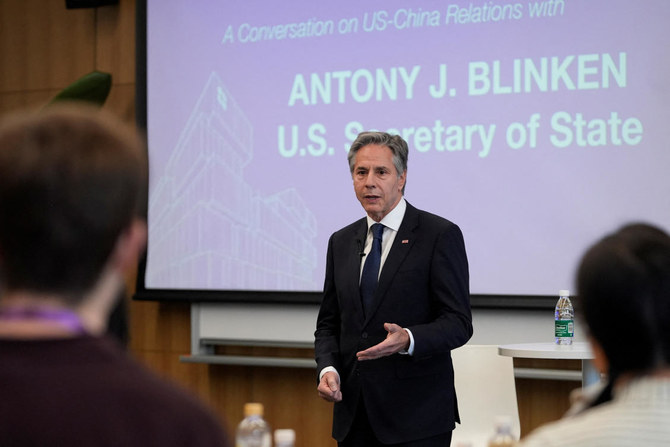
- China has not announced plans for US Secretary of State to meet Xi Jinping
- Antony Blinken is the first US secretary of state in 14 years to visit Shanghai
SHANGHAI: US Secretary of State Antony Blinken called Thursday on the United States and China to manage their differences “responsibly” as he went on a charm offensive ahead of expected tough talks.
A day before meeting Beijing’s top brass to tackle thorny issues including Russia, Taiwan and trade, Blinken’s visit to Shanghai has seen him sample local food, watch a basketball game and stroll along the city’s famous Bund promenade.
Visiting the local Communist Party leader in a room with sweeping views of the Shanghai skyline, Blinken said US President Joe Biden was committed to “direct and sustained” dialogue between the world’s two largest economies after years of mounting tension.
“I think it’s important to underscore the value — in fact, the necessity — of direct engagement, of speaking to each other, laying out our differences, which are real, seeking to work through them,” Blinken said.
“We have an obligation for our people — indeed an obligation to the world — to manage the relationship between our two countries responsibly.”
The Chinese Communist Party secretary for Shanghai, Chen Jining, welcomed Blinken partly in English and spoke of the importance of US businesses to the city.
“Whether we choose cooperation or confrontation affects the well-being of both peoples, both countries and the future of humanity,” Chen told him.
The country’s financial capital, Shanghai is often a stepping stone to power in China, with President Xi Jinping previously serving briefly in the city.
China has not announced plans for Blinken to meet Xi, although on Blinken’s last visit in June, they saw each other in a meeting announced at the last minute.
On Thursday, Blinken also met students at the Shanghai campus of New York University, where he voiced hope for more Americans to study in China.
He insisted the United States was committed to welcoming Chinese students.
Beijing has repeatedly alleged that Chinese nationals with valid travel documents, including students, have been subject to aggressive interrogations and deportations at US airports.
“President Biden and President Xi are determined to strengthen our people-to-people ties,” Blinken said.
Blinken, the first US secretary of state in 14 years to visit Shanghai, opened his visit Wednesday evening at a restaurant serving steamed buns.
Sporting a suit without a tie, he ate with his senior staff in a shopping arcade as curious onlookers snapped pictures.
Blinken then went to watch a basketball game between the Shanghai Sharks and Zhejiang Golden Bulls, staying until the end of the nail-biting play-off.
Such softer diplomacy, once a staple of US-China relations, would have been unimaginable until recently, with hawks in both countries speaking of an emerging new Cold War.
Blinken’s aides hope his smiling persona at public events draws an implicit contrast to his Russian counterpart Sergei Lavrov and his gruffer approach when he visited China earlier this month.
Blinken is expected to raise concerns about China’s relationship with Russia when he meets the leadership in Beijing.
Although US officials were initially pleased that Beijing has not shipped weapons to Russia for its war in Ukraine, they now say that China’s alarm at Moscow’s setbacks on the battlefield has prompted it to export vast quantities of industrial supplies to Russia.
US officials believe China is more receptive to Western concerns as it seeks to focus on managing economic headwinds at home and wants to avoid friction with the West.
But China is also furious about a series of moves by Biden — who is facing a tough re-election fight in November against Donald Trump — they say serve to constrain the Chinese economy.
Most recently, the US Congress approved legislation that would force the divestment of blockbuster social media app TikTok from its Chinese owners or face a ban in the world’s largest economy.
Biden supports the legislation, arguing that TikTok, popular among young people, poses security and privacy concerns. China has accused the United States of unfair economic coercion.
Unusually, Trump has distanced himself from a TikTok ban. He has otherwise championed a tough line on China, with vows to raise tariffs drastically if he returns to office.
US officials also say that Blinken will encourage China to act with restraint as Taiwan inaugurates a new president next month.
China claims the self-governing democracy as its own and has not ruled out using force to seize it.
Privately, US officials were relieved by China’s approach during Taiwan’s election, believing that easing US-China tensions helped.
They assessed that Beijing’s assertive military moves did not go beyond past precedent.
Rwanda’s Hope Hostel once housed young genocide survivors. Now it’s ready for migrants from Britain
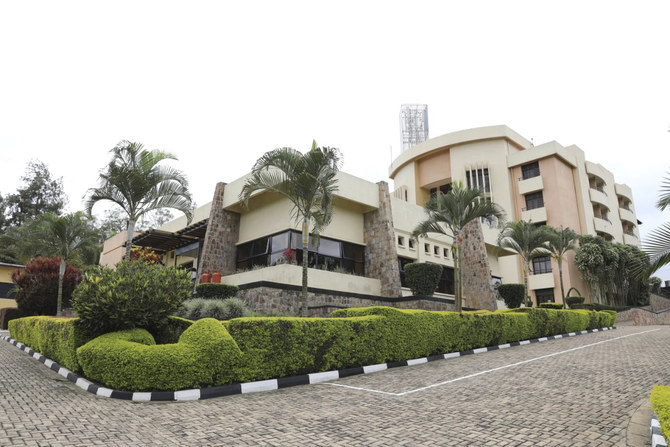
KIGALI, Rwanda: Rwanda says it’s ready to receive migrants from the United Kingdom after British Parliament this week approved a long-stalled and controversial bill seeking to stem the tide of people crossing the English Channel in small boats by deporting some of them to the East African country.
There is even a place ready and waiting for the migrants — a refurbished Hope Hostel in the vibrant upscale neighborhood of Kagugu, an area of the Rwandan capital of Kigali that is home to many expats and several international schools.
The hostel once housed college students whose parents died in the 1994 genocide, this African nation’s most horrific period in history when an estimated 800,000 Tutsi were killed by extremist Hutu in massacres that lasted over 100 days.
British Prime Minister Rishi Sunak has pledged the deportation flights would begin in July but has refused to provide details or say about how many people would be deported.
Rwanda government’s deputy spokesperson Alain Mukuralinda told The Associated Press on Tuesday that authorities here have been planning for the migrants’ arrival for two years.
“Even if they arrive now or tomorrow, all arrangements are in place,” he said.
The plan was long held up in British courts and by opposition from human rights activists who say it is illegal and inhumane. It envisages deporting to Rwanda some of those who enter the UK illegally and migrant advocates have vowed to continue to fight against the plan.
The measure is also meant to be a deterrent to migrants who risk their lives in leaky, inflatable boats in hopes that they will be able to claim asylum once they reach Britain. The UK also signed a new treaty with Rwanda to beef up protections for migrants, and adopted new legislation declaring Rwanda to be a safe country.
“The Rwanda critics and the UK judges who earlier said Rwanda is not a safe country have been proven wrong,” Mukuralinda said. “Rwanda is safe.”
The management at the four-story Hope Hostel says the facility is ready and can accommodate 100 people at full capacity. The government says it will serve as a transit center and that more accommodations would be made available as needed.
Thousands of migrants arrive in Britain every year.
After they arrive from Britain, the migrants will be shown to their rooms to rest, after which they will be offered food and given some orientation points about Kigali and Rwanda, said hostel manager Ismael Bakina.
Tents will be set up within the hostel’s compound for processing their documentation and for various briefings. The site is equipped with security cameras, visible across the compound.
Within the compound are also entertainment places, a mini-soccer field, a basketball and a volleyball court as well as a red-carpeted prayer room. For those who want to light up, “there is even a smoking room,” Bakina explained.
Meals will be prepared in the hostel’s main kitchen but provisions are also being made for those who want to prepare their own meals, he said. The migrants will be free to walk outside the hostel and even visit the nearby Kigali city center.
“We will have different translators, according to (their) languages,” Bakina added, saying they include English and Arabic.
The government has said the migrants will have their papers processed within the first three months. Those who want to remain in Rwanda will be allowed to do so while authorities will also assist those who wish to return to their home countries.
While in Rwanda, migrants who obtain legal status — presumably for Britain — will also be processed, authorities have said, though it’s unclear what that means exactly.
For those who choose to stay, Mukurilinda said Rwanda’s government will bear full financial and other responsibilities for five years, after which they will be considered integrated into the society.
At that point, they can start managing on their own.
Russia vetoes a UN resolution calling for the prevention of a dangerous nuclear arms race in space
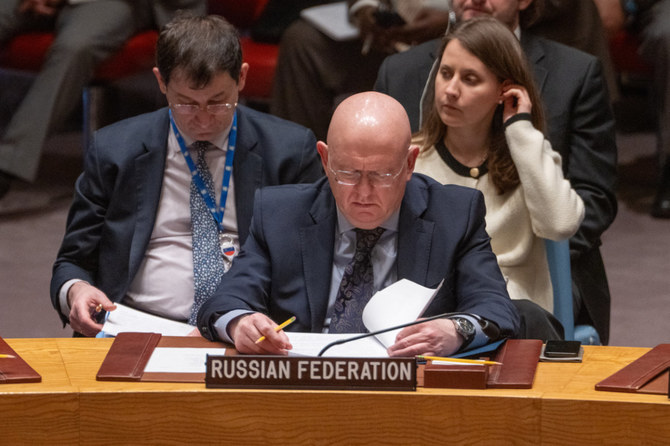
- The vetoed resolution sought to call on all countries not to develop or deploy nuclear arms or other weapons of mass destruction in space
- Russia dismissed the resolution as “absolutely absurd and politicized” and didn’t go far enough in banning all types of weapons in space
UNITED NATIONS: Russia on Wednesday vetoed a UN resolution sponsored by the United States and Japan calling on all nations to prevent a dangerous nuclear arms race in outer space, calling it “a dirty spectacle” that cherry picks weapons of mass destruction from all other weapons that should also be banned.
The vote in the 15-member Security Council was 13 in favor, Russia opposed and China abstaining.
The resolution would have called on all countries not to develop or deploy nuclear arms or other weapons of mass destruction in space, as banned under a 1967 international treaty that included the US and Russia, and to agree to the need to verify compliance.
US Ambassador Linda Thomas-Greenfield said after the vote that Russian President Vladimir Putin has said Moscow has no intention of deploying nuclear weapons in space.

“Today’s veto begs the question: Why? Why, if you are following the rules, would you not support a resolution that reaffirms them? What could you possibly be hiding,” she asked. “It’s baffling. And it’s a shame.”
Putin was responding to White House confirmation in February that Russia has obtained a “troubling” anti-satellite weapon capability, although such a weapon is not operational yet.
US National Security Advisor Jake Sullivan on Wednesday echoed Thomas-Greenfield, reiterating that “the United States assesses that Russia is developing a new satellite carrying a nuclear device.” If Putin has no intention of deploying nuclear weapons in space, Sullivan said, “Russia would not have vetoed this resolution.”
Russia’s UN Ambassador Vassily Nebenzia dismissed the resolution as “absolutely absurd and politicized,” and said it didn’t go far enough in banning all types of weapons in space.
Russia and China proposed an amendment to the US-Japan draft that would call on all countries, especially those with major space capabilities, “to prevent for all time the placement of weapons in outer space, and the threat of use of force in outer spaces.”
The vote was 7 countries in favor, 7 against, and one abstention and the amendment was defeated because it failed to get the minimum 9 “yes” votes required for adoption.
The US opposed the amendment, and after the vote Nebenzia addressed the US ambassador saying: “We want a ban on the placement of weapons of any kind in outer space, not just WMDs (weapons of mass destruction). But you don’t want that. And let me ask you that very same question. Why?”
He said much of the US and Japan’s actions become clear “if we recall that the US and their allies announced some time ago plans to place weapons … in outer space.”
Nebenzia accused the US of blocking a Russian-Chinese proposal since 2008 for a treaty against putting weapons in outer space.
Thomas-Greenfield accused Russia of undermining global treaties to prevent the spread of nuclear weapons, irresponsibly invoking “dangerous nuclear rhetoric,” walking away from several of its arms control obligations, and refusing to engage “in substantive discussions around arms control or risk reduction.”
She called Wednesday’s vote “a real missed opportunity to rebuild much-needed trust in existing arms control obligations.”
Thomas-Greenfield’s announcement of the resolution on March 18 followed White House confirmation in February that Russia has obtained a “troubling” anti-satellite weapon capability, although such a weapon is not operational yet.
Putin declared later that Moscow has no intention of deploying nuclear weapons in space, claiming that the country has only developed space capabilities similar to those of the US.
Thomas-Greenfield said before the vote that the world is just beginning to understand “the catastrophic ramifications of a nuclear explosion in space.”
It could destroy “thousands of satellites operated by countries and companies around the world — and wipe out the vital communications, scientific, meteorological, agricultural, commercial, and national security services we all depend on,” she said.
The defeated draft resolution said “the prevention of an arms race in outer space would avert a grave danger for international peace and security.” It would have urged all countries carrying out activities in exploring and using outer space to comply with international law and the UN Charter.
The draft would have affirmed that countries that ratified the 1967 Outer Space Treaty must comply with their obligations not to put in orbit around the Earth “any objects” with weapons of mass destruction, or install them “on celestial bodies, or station such weapons in outer space.”
The treaty, ratified by some 114 countries, including the US and Russia, prohibits the deployment of “nuclear weapons or any other kinds of weapons of mass destruction” in orbit or the stationing of “weapons in outer space in any other manner.”
The draft resolution emphasized “the necessity of further measures, including political commitments and legally binding instruments, with appropriate and effective provisions for verification, to prevent an arms race in outer space in all its aspects.”
It reiterated that the UN Conference on Disarmament, based in Geneva, has the primary responsibility to negotiate agreements on preventing an arms race in outer space.
The 65-nation body has achieved few results and has largely devolved into a venue for countries to voice criticism of others’ weapons programs or defend their own. The draft resolution would have urged the conference “to adopt and implement a balanced and comprehensive program of work.”
At the March council meeting where the US-Japan initiative was launched, UN Secretary-General António Guterres warned that “geopolitical tensions and mistrust have escalated the risk of nuclear warfare to its highest point in decades.”
He said the movie “Oppenheimer” about Robert Oppenheimer, who directed the US project during World War II that developed the atomic bomb, “brought the harsh reality of nuclear doomsday to vivid life for millions around the world.”
“Humanity cannot survive a sequel to Oppenheimer,” the UN chief said.






